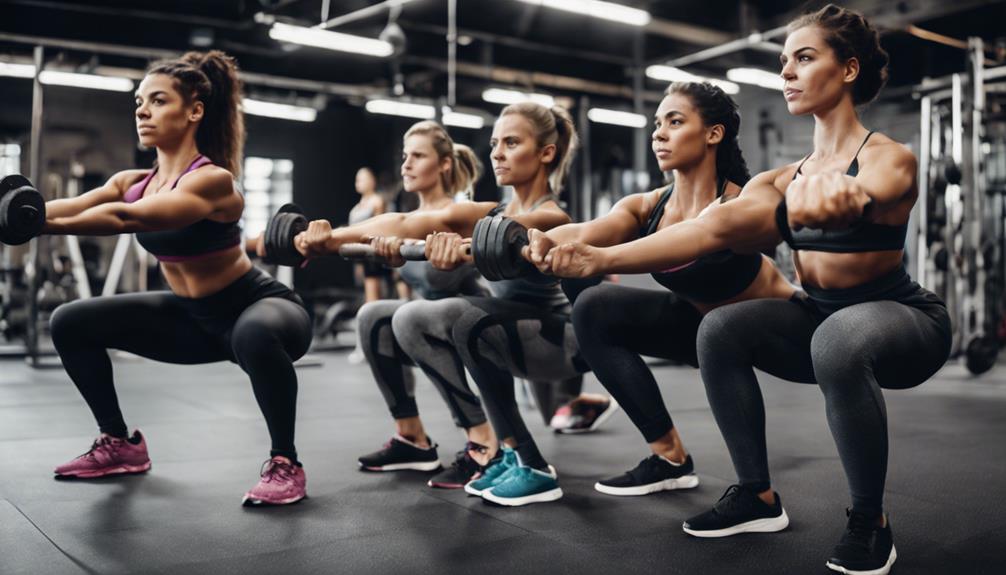How to Improve Women’s Bone Health Naturally
You may not be aware that women are at a higher risk of developing osteoporosis compared to men due to factors like hormonal changes and lower peak bone mass. However, there are natural ways you can enhance your bone health without medications or treatments. By making simple adjustments to your diet, engaging in specific exercises, and adopting healthy lifestyle practices, you can significantly improve the strength and density of your bones over time. Keep reading to discover practical strategies that can help you safeguard your bone health and overall well-being.
Importance of Bone Health
Ensuring optimal bone health is crucial for overall well-being and longevity. Bone density, referring to the strength and mineral content of your bones, is a key indicator of bone health.
Hormonal balance, especially in women, plays a significant role in maintaining healthy bones. Estrogen, for example, helps protect bones, and its decline during menopause can lead to bone loss.
To support your bone health, focus on activities that promote bone density such as weight-bearing exercises and resistance training. Additionally, ensure you're getting enough calcium and vitamin D through your diet or supplements.
Foods rich in calcium like dairy products, leafy greens, and fortified foods can help maintain bone strength. Vitamin D is essential for calcium absorption, so spending time in the sun and consuming fatty fish or fortified products can aid in keeping your bones strong.
Prioritize hormonal balance and bone density to support your overall well-being.
Balanced Diet for Strong Bones
To maintain strong and healthy bones, a balanced diet rich in essential nutrients is key. Incorporating plant-based sources of calcium, such as leafy greens, tofu, and almonds, is vital for bone health. These foods provide not only calcium but also other essential nutrients like vitamin K and magnesium necessary for bone strength.
Additionally, focusing on foods high in vitamin C, such as citrus fruits and bell peppers, can aid in collagen production, supporting bone flexibility and resilience.
Furthermore, considering nutrient absorption is crucial. Pairing calcium-rich foods with sources of vitamin D, like fortified cereals and fatty fish, can enhance the body's ability to absorb and utilize calcium effectively. Including foods rich in phosphorus, such as lentils and pumpkin seeds, can also support bone mineralization.
Vitamin D and Calcium Intake
For optimal bone health, it's essential to pay attention to your intake of vitamin D and calcium. Vitamin D plays a crucial role in calcium absorption, aiding in the maintenance of strong bones. To ensure you're getting enough vitamin D, aim for regular sun exposure and consider supplements if needed, especially if you live in areas with limited sunlight.
When it comes to calcium intake, incorporating dairy products like milk, yogurt, and cheese can be beneficial. However, if you're lactose intolerant or follow a vegan diet, you can still get calcium from sources like leafy greens, almonds, and fortified plant-based milks. Aim to include these foods in your meals regularly to support your bone health.
Weight-Bearing Exercises
When incorporating weight-bearing exercises into your routine, you're taking a proactive step towards enhancing your bone health naturally. Strength training and impact sports are fantastic options to consider.
Strength training, such as lifting weights or using resistance bands, helps build muscle mass and strengthen bones. Impact sports like running, dancing, or tennis, where your feet and legs bear your body weight, are also beneficial for bone health.
Engaging in these activities helps stimulate bone growth and increase bone density. The stress placed on your bones during weight-bearing exercises signals your body to build stronger bones to meet the demands of these activities.
Regularly including these exercises in your routine can significantly reduce the risk of osteoporosis and fractures as you age.
Resistance Training Benefits
As you continue to prioritize your bone health through weight-bearing exercises, it's essential to recognize the specific benefits that resistance training can offer. Resistance training plays a crucial role in enhancing muscle strength, which, in turn, supports your bone health. By engaging in resistance exercises such as lifting weights or using resistance bands, you stimulate muscle growth and development, leading to stronger bones.
Moreover, resistance training also contributes to improved joint health. The exercises involved in resistance training help to stabilize and support your joints, reducing the risk of injuries and promoting overall joint function.
Strong muscles around your joints provide better protection and support, which is vital for maintaining bone health as you age.
Incorporating resistance training into your exercise routine not only benefits your muscle strength but also supports your joint health, ultimately contributing to better bone health overall. Make sure to include a variety of resistance exercises to target different muscle groups and enhance the benefits for your bones.
Yoga and Pilates for Bone Strength
Enhance your bone strength and flexibility through the practice of yoga and Pilates. These exercises not only promote physical well-being but also contribute to bone health. Yoga and Pilates are known for their emphasis on flexibility training, which can help improve joint mobility and reduce the risk of fractures. Additionally, both practices focus on core strengthening, which is essential for maintaining good posture and balance, ultimately supporting bone health.
Yoga incorporates various poses that target different muscle groups, including those important for bone density. Poses like the tree pose or downward-facing dog can help enhance strength and flexibility in the spine and lower body.
Pilates, on the other hand, emphasizes controlled movements that engage the core muscles, promoting stability and balance while also supporting bone health.
Limiting Alcohol and Caffeine
To further support your bone health journey, it's important to consider the impact of your lifestyle choices on your bones. When it comes to alcohol consumption and caffeine intake, moderation is key. Excessive alcohol can interfere with the balance of calcium in your body, leading to weaker bones over time. Aim to limit alcohol intake to no more than one drink per day.
Caffeine, found in coffee, tea, and some sodas, can also affect your bone health. High caffeine intake has been linked to a decrease in calcium absorption, which is essential for bone strength. Try to moderate your caffeine consumption by opting for decaffeinated options or limiting yourself to a moderate amount each day.
Quit Smoking for Bone Health
Consider this essential step towards optimizing your bone health: Quit smoking. Smoking not only affects your lungs but also has detrimental effects on your bone health. Nicotine, the addictive component in cigarettes, has been shown to decrease bone density and increase the risk of fractures. By quitting smoking, you can significantly improve your bone health and reduce the chances of osteoporosis in the future.
To help you in your journey to quit smoking, here are some healthy alternatives to consider:
| Nicotine Effects | Healthy Alternatives |
|---|---|
| Decreases bone density | Exercise regularly |
| Increases fracture risk | Chew sugar-free gum |
| Impairs bone healing | Practice deep breathing |
Stress Management Techniques
Stress can significantly impact your overall well-being, including your bone health. Incorporating mindfulness practices and relaxation techniques into your daily routine can help manage stress levels, ultimately benefiting your bones. Mindfulness practices, such as meditation or deep breathing exercises, can reduce the production of stress hormones like cortisol, which can weaken bones over time. By incorporating mindfulness into your day, you can lower stress levels and support better bone health.
Relaxation techniques, like yoga or progressive muscle relaxation, can also help alleviate stress and tension in the body. These practices promote relaxation and reduce muscle tightness, which can contribute to overall stress reduction. When your body is more relaxed, it can function optimally, including supporting bone health.
Incorporating these stress management techniques into your daily life can have a positive impact on your bone health over time. By prioritizing mindfulness and relaxation, you're taking proactive steps to support your overall well-being and bone health.
Regular Bone Density Check-ups
How often should you be getting your bone density checked? Regular bone density check-ups are crucial for assessing your bone health and catching any issues early. Prevention strategies and lifestyle changes can significantly impact your bone density. Here are some key points to consider:
- Age: As you age, the risk of osteoporosis increases, so regular check-ups are essential, especially for women over 65.
- Family History: If you have a family history of osteoporosis or fractures, more frequent screenings may be necessary.
- Menopause: After menopause, women are at a higher risk of bone density loss, making regular checks vital.
- Medication: Certain medications can affect bone health, so monitoring bone density is important if you're on long-term medication.
- Nutritional Status: Ensuring you have adequate calcium, vitamin D, and other nutrients can support bone health and impact your bone density results positively.
Frequently Asked Questions
Can Genetics Play a Role in Women's Bone Health?
Genetic factors strongly influence bone health outcomes in women. Lifestyle choices, hormonal influences, and menopausal impacts also play pivotal roles. Understanding these interplays can help you proactively manage and support your bone health naturally.
Are There Any Specific Foods to Avoid for Stronger Bones?
To strengthen your bones, it's wise to limit sugar's negative impact. Consider choosing dairy alternatives rich in calcium and vitamin D instead. These swaps can support bone health while helping you avoid foods that may hinder it.
How Soon Can One See Improvements in Bone Health With Exercise?
With consistent exercise, you may notice improvements in bone health within a few months. Higher exercise frequency can speed up bone density gains. Stay dedicated and remember that progress takes time, but every workout benefits your bones.
Is There a Link Between Hormonal Changes and Bone Density?
Intricate as a delicate dance, hormonal balance and bone density correlation are intertwined. Your lifestyle changes and dietary impact play vital roles. Prioritize nourishing foods, weight-bearing exercises, and consult a healthcare provider for personalized guidance.
Can Menopause Affect Bone Health Differently for Women?
Menopause can impact bone health differently for women due to hormonal fluctuations. As estrogen decreases, bone density may decline, increasing fracture risk. Age-related changes can further affect bone health. Regular exercise and a calcium-rich diet are key for bone strength.
Conclusion
In conclusion, by focusing on a balanced diet rich in calcium and vitamin D, engaging in weight-bearing exercises and resistance training, and adopting healthy lifestyle choices, you can naturally improve your bone health as a woman. Remember, taking care of your bones now will benefit you in the long run, ensuring a strong and healthy foundation for a vibrant and active life. Start implementing these simple yet effective strategies today for stronger bones tomorrow.














